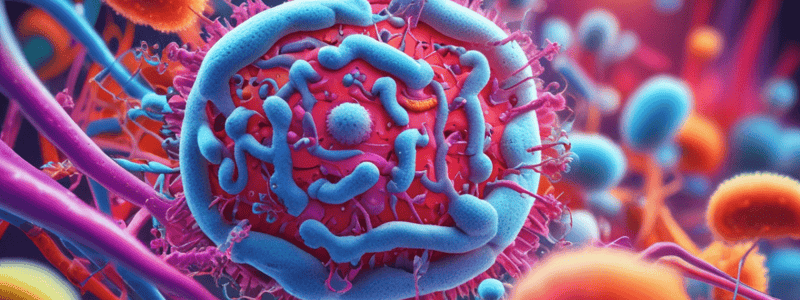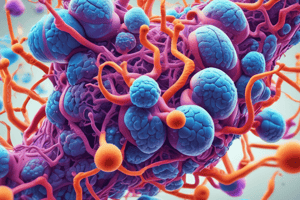Podcast
Questions and Answers
What is one of the benefits of using microorganisms in industrial settings for chemical production?
What is one of the benefits of using microorganisms in industrial settings for chemical production?
- Reducing risks associated with chemical synthesis (correct)
- Using more hazardous raw materials
- Increasing the cost of production
- Introducing more toxic by-products
Why are by-products of biosynthetic reactions typically considered less toxic and hazardous?
Why are by-products of biosynthetic reactions typically considered less toxic and hazardous?
- As a result of the nature of the reactions carried out by microorganisms (correct)
- Because industrial chemicals are added to increase toxicity
- Due to the absence of any by-products in biosynthetic reactions
- Because microorganisms naturally neutralize toxic chemicals
What percentage of living matter is comprised of microorganisms?
What percentage of living matter is comprised of microorganisms?
- 25%
- 10%
- 50% (correct)
- 75%
Why is it surprising that less than 1% of all bacteria have been identified, studied, and cultivated in laboratories?
Why is it surprising that less than 1% of all bacteria have been identified, studied, and cultivated in laboratories?
What is the approximate age of microbes on Earth based on the information provided?
What is the approximate age of microbes on Earth based on the information provided?
Why are microorganisms often referred to as 'living factories' in industrial microbiology?
Why are microorganisms often referred to as 'living factories' in industrial microbiology?
Which of the following is NOT a major industrial area where microbial biotechnology has applications?
Which of the following is NOT a major industrial area where microbial biotechnology has applications?
What is the primary purpose of industrial microbiology according to the passage?
What is the primary purpose of industrial microbiology according to the passage?
Which of the following microorganisms is NOT explicitly mentioned in the passage as being used in microbial biotechnology?
Which of the following microorganisms is NOT explicitly mentioned in the passage as being used in microbial biotechnology?
According to the passage, which of the following is NOT a potential breakthrough or improvement enabled by microbial biotechnology?
According to the passage, which of the following is NOT a potential breakthrough or improvement enabled by microbial biotechnology?
Which of the following is the BEST definition of microbial biotechnology according to the passage?
Which of the following is the BEST definition of microbial biotechnology according to the passage?
Flashcards are hidden until you start studying
Study Notes
Industrial Microbiology and Microbial Biotechnology
- Microorganisms are used in industrial settings to produce chemicals, antibiotics, organic compounds, and pharmaceuticals.
- Using living organisms as chemical synthesis factories reduces risks and replaces polluting raw materials with less expensive processes.
- Biosynthetic reaction by-products are usually less toxic and hazardous than those of industrial chemical reactions.
Microorganisms
- Microbes have existed on earth for over 3.5 billion years.
- 50% of living matter is comprised of microorganisms.
- Less than 1% of all bacteria have been identified, cultivated, and studied in the laboratory.
History of Industrial Microbiology and Microbial Biotechnology
- No specific history mentioned, but a homework assignment is given to search for a local product that uses microbial biotechnology.
Biotechnology Definition
- Biotechnology is the study of biological processes, organisms, cells, or cellular components exploited to develop new technologies.
- Includes viruses, bacteria, algae, fungi, and protozoa.
Microbial Biotechnology Applications
- Health care (Medical)
- Crop Production and Agriculture
- Food and Beverages
- Non-food (industrial) uses of crops
- Other products (e.g., biodegradable plastics, vegetable oil, biofuels)
- Environmental uses
Microbial Biotech Enabled by Genome Studies
- Will lead to breakthroughs in:
- New industrial catalysts
- Fermentation organisms
- Improved vaccines
- Bioremediation
- Better disease-diagnostic tools
- Improved microbial agents
- Reduced virulence
- Food safety
- Food security
- Value-added products
- Human nutrition
- Functional foods
Studying That Suits You
Use AI to generate personalized quizzes and flashcards to suit your learning preferences.




